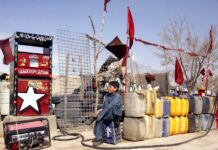Pakistan’s ranking on the influential Global Competitiveness Index of the World Economic Forum (WEF) has slipped by three spots to 110, out of 141 countries.
According to WEF’s Global Competitive Report of 2019, the country fared poorer than last year on indicators of freedom of press and corruption but significantly improved its ranking on reducing organised crimes and ensuring judicial independence. The life expectancy has gone down by six months to 58 years.
One of the surprising outcomes of the report was that Pakistan remained at the bottom of the index of terrorism incidences despite marked improvement in the country’s security situation and no major terror attack in the past one year.
Islamabad also remains on the bottom of the South Asian nations, according to the new report that compared governance, innovation, productivity and human development in 141 countries this time as opposed to 140 in the previous year.
The report, which the WEF’s local partner Mishal released on Wednesday, ranked Pakistan at 110th this year as compared to 107th position last year.
This year, among 103 global competitiveness indicators, Pakistan showed improvements on 42 key indices, whereas on 39 indices the country lost its previous position. In 10 indices, the position remained the same as last year while 12 new indices were introduced this year.
On the institution pillar, Pakistan improved two ranks and stood at 107 this year. The labour market efficiency ranking also improved by one notch to 120 but it was still closer to bottom 20 nations. On the market size pillar, there was improvement of two points and the ranking stood at impressive 29. Similarly, on the pillar of business dynamics, the country’s position jumped by 15 notches to 52.
The maximum deterioration was on the pillar of macroeconomic stability where Pakistan lost 13 ranks and stood at 116 due to marked deterioration in indices of inflation and debt dynamics.
On the infrastructure pillar, Pakistan’s position slipped by seven notches to 105, on ICT adoption it lost four positions and slipped to 131 – among the bottom 10 nations.
“Pakistan needs to bridge the digital divide between citizens’ demand for governance and governments’ ability to deliver services through digital and e-governance platforms,” said Mishal Pakistan Chief Executive Officer Amir Jahangir. “The public policy agenda should have ICT adoption as one of the key drivers for transforming the economy to succeed in the fourth industrial revolution era.”
On both the pillars of the human capital, the country fared poor. Its position on health pillar slipped by six notches to 115 and the ranking remained unchanged at 125 on the skills pillar.
On the pillar of products market, Pakistan’s position was 126 – four positions lower than the last year. On the pillar of financial systems, the ranking deteriorated by 10 points and stood at 99.
On the pillar of innovation capability, Pakistan secured 79th position – four notches below the last year’s level.
Compared with its regional peers, Pakistan ranked at the bottom. Among the five surveyed nations, India was still at top on 68th position despite losing 10 positions compared with last year. Sri Lanka at 84th position was the second most competitive economy in South Asia, followed by Bangladesh 105 and Nepal 108.
Meanwhile, the United States fell to second place behind Singapore in the report, with the slippage linked in part to President Donald Trump’s trade wars.
The Netherlands overtook overtaken Germany to become the most competitive country in Europe.
























Government should increase taxes on telecom’ services. There’s still room for us to fall further in the ICT rankings.
PTA should demand more money for license renewal and bring DIRBS 2.0 to wreck further havoc in the hardware market.